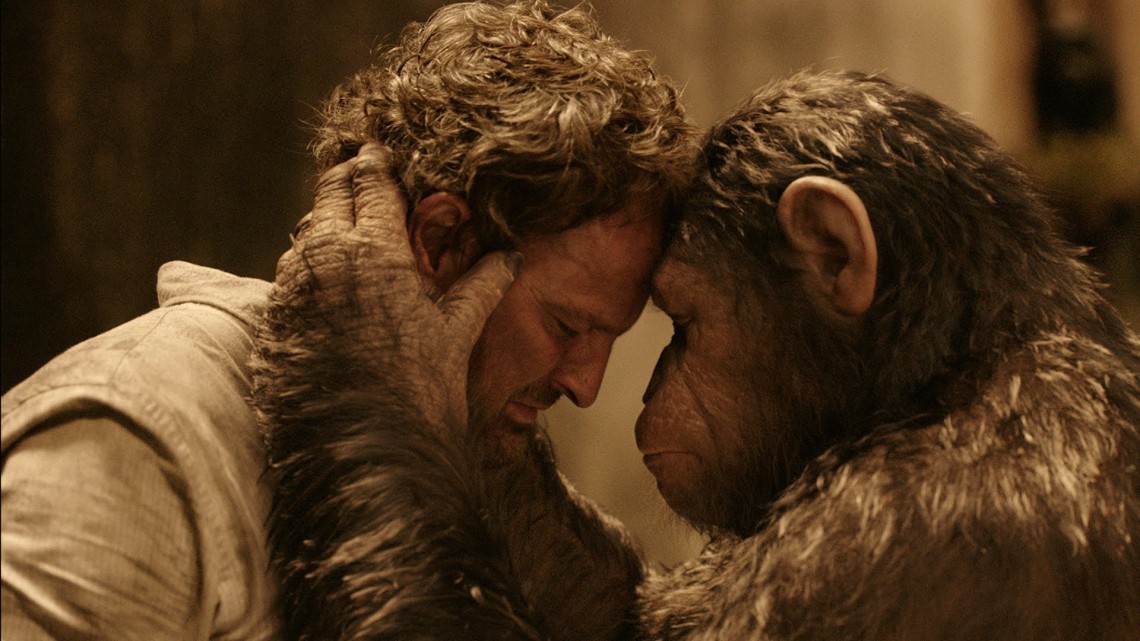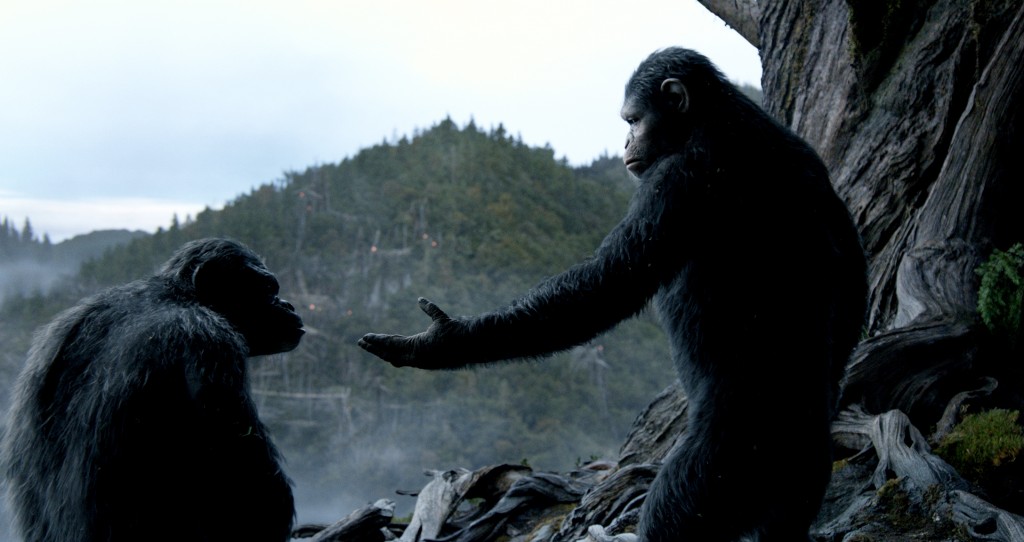“Somewhere in the universe, there must be something better than man.” The iconic tagline for 1968’s Planet of the Apes is alive and well, almost 50 years later. Seven sequels and two attempts at a reinvention later, Matt Reeves has delivered the best film in one of the most storied franchises in history since the original, Dawn of the Planet of the Apes. Where most blockbusters relish in action and encourage audience engagement through applause for set pieces, Reeves’s film sets itself apart by giving every act of violence, or even just the threat of it, terrible consequences. It’s a beautifully crafted meditation on nothing less than the very meaning of murder, a Shakespearean tragedy, and a sci-fi retelling of Cain & Abel.
Catching up ten years after 2011’s Rise of the Planet of the Apes, Caesar and his Ape community have built a civilization in the Muir Woods, only to be interrupted by their first encounter with humans (who were nearly wiped out by a virus and war) in years. Caesar’s most trusted advisor, Koba, feels this is the perfect opportunity to annihilate them once and for all, but Caesar refuses, simply offering up a display of his forces and giving the humans an ultimatum “Stay away or face our wrath”, avoiding bloodshed for the time being. Naturally, Koba is frustrated by the decision to reach a tentative peace, setting in motion a conflict that draws upon Macbeth, Richard III, and almost downright casts him as the Brutus to Caesar.
“Koba learned only to hate from the humans, and nothing else’, Caesar muses. Is it possible to sway a heart filled with nothing but rage and pain? With no outlet for his anger for a decade, it’s done nothing but fester in Koba, hidden under the surface of his many scars, only to be opened all over again by the resurfacing of the humans. While Caesar insists that peace must be maintained to secure the Apes’ future, every time Koba challenges him, Caesar responds with a display of physical strength. It’s a curious mirror to Koba’s “Might makes right” philosophy about the humans. Why must desires for peace be enforced by martial law? Is that truly the only way to maintain civilization?
“Ape not kill Ape”, Caesar mutters as he very nearly chokes Koba to death after a brutal altercation. Dedicated to a society that must be better than the humans who destroyed themselves, he refuses to kill one of his own, even when his leadership is questioned. It’s as simple a principle as one most societies’ laws against murder, but somehow carries more importance here, as Caesar attempts to prove himself, and his kin, better than the rest. There’s a small chance for utopia with these laws, and Caesar truly believes in it.
Take the way he gains Rocket and Buck’s loyalty in Rise. Instead of beating either into submission or killing Rocket as revenge for his bullying, he shows them that “Apes Together Strong”, something he holds to for his entire life. The idealistic revolutionary of Rise is gone now, matured into a conflicted yet strong leader, one whose own actions of violence against an ape he called brother disturbs him. He’s certainly capable of killing Koba, and only holds back when confronted with the dark possibility of betraying his own principles, and thus, undoing everything he’s fought for.
This confrontation is the undoing of it all, breaking Caesar and Koba’s bond forever, and setting in motion the very first (attempted) murder in Ape society. Koba shoots Caesar down, framing the humans for it, and claims the throne for himself in order to lead the Apes on a righteous crusade to destroy the humans once and for all. It’s a series of events where no side is in the right, and yet neither is wrong. Even Koba’s motivations, while selfish on paper, still have a sense of moral merit to them. His rage is justified, but if Apes are to truly be better than humans, is this the way to show them?
It’s telling, then, that the film brings us back to a lot of the more complex questions set forth in the 1968 original. Up until his capture at the hands of the Apes, Taylor’s view of humanity is rather bleak, believing that they probably deserve to fade away after warring with one another for all of history. Yet, all that cynicism flies out the window after his capture, falling back on classic human egocentrism to flaunt his superiority over what he sees as a lesser species. It’s only in his discovery of the true fate of humanity that his optimism is swiftly crushed; much in the way Caesar’s hope is crushed by Koba’s betrayal.
“I always think Ape better than human, but now I see how like them we are.” Is Caesar, then, our modern-day Taylor? For years, these films have held up a dark mirror to humanity, creating a series of biting criticism of our war-mongering and fear-driven society, but are the Apes really a better successor? Dawn posits that perhaps it’s all a wash; we’re doomed to repeat our mistakes no matter what species is at the top. While this summer’s earlier films, Godzilla and Snowpiercer, took similarly critical views of the future of humanity, Dawn feels like the most fully realized one, only to leave the allegory in more ambiguous territories than the other two, and with much more troubling implications. We must break the cycle of hatred that breeds people like Koba, and look to our potential for peace and understanding. We must strive towards a better future for our children, even if we are beyond saving.
“Home. Family. Future.”


















